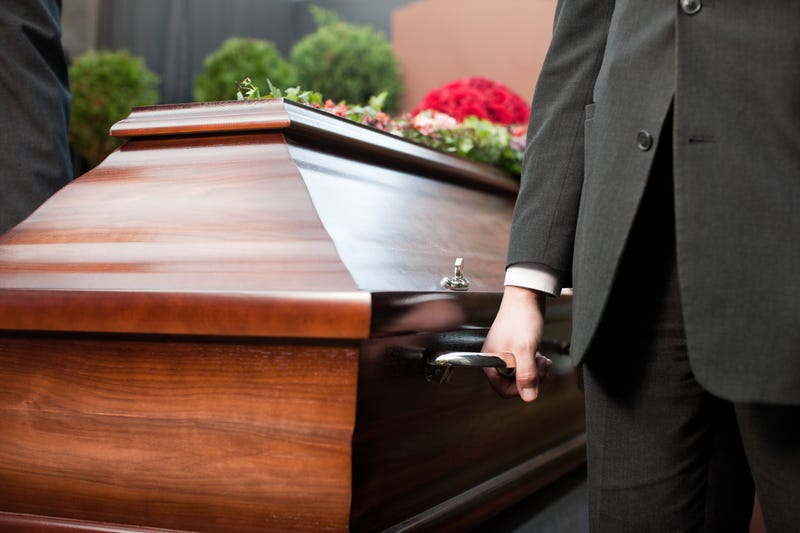
Shortly after the Kerrigan family of Orange County, Calif., buried whom they believed to be their relative Frankie Kerrigan in May 2017, he showed up alive at a family friend’s home.
An Orange County Superior Court jury Tuesday found that the coroner’s office “committed negligence and intentional misrepresentation,” in misidentifying the body and awarded the family $1.5 million in damages.
According to a Los Angeles Times report, the Orange County coroner’s office told Frankie Kerrigan’s family that he had been found dead near blood-smeared pavement at the Fountain Valley strip mall. Kerrigan, who was in his fifties, has “profound schizophrenia,” resists taking medication and has lived on and off the streets for years, said the outlet.
How did it happen?
According to the Los Angeles Times, a Fountain Valley police officer told veteran deputy coroner David Ralsten, who is now retired, that the body found outside at the mall resembled Frankie Kerrigan, who was known to live on the area’s streets.
In fact, the man found was John Dean Dickens, 54, another houseless man who died of heart disease.
To identify the body, Ralsten used an 11-year-old DMV photo of Kerrigan and compared it to Dickens’ face, which was covered in blood and vomit.
He determined that the noses had a similar width, and that the chins were the same.
“I did look at multiple features,” Ralsten testified. “They did appear to be the same person, Mr. Kerrigan and the deceased.”
Although he made a positive ID of the body as Kerrigan, Ralsten expected the ID to be confirmed with fingerprints through a system installed five months before the body was found. This process was carried out and a check against local, state and federal databases quickly established that the corpse was Dickens.
However, when Ralsten went on vacation, the system wasn’t checked.
“We essentially had no significant training” on it, Ralsten said.
“It’s just inexcusable that the coroner’s office doesn’t understand how their system worked,” V. James DeSimone, the plaintiffs’ attorney, told jurors.
Despite the check, authorities erroneously notified the Kerrigan family of Frankie’s death.
“This is going to haunt the Kerrigan family for the rest of their lives,” said DeSimone.
How the news shook Kerrigan’s family
“My worst fear was my brother would die alone in a pile of blood on a sidewalk,” said Frankie’s sister Carole Meikle. His father, Francis Kerrigan – who was 81 at the time of the incident – is another of the plaintiffs. He was called to the mall scene nearly five years ago.
When he arrived, Kerrigan’s father searched for items he knew his son kept with him: a pen, a wristwatch and a black attaché case. He didn’t find the items.
Even so, the family held a wake, Catholic mass and burial in their family plot for the body. Francis Kerrigan was too consumed by grief during the open-casket memorial service to realize the man inside was not his son.
“I touched his hair, and I said goodbye,” Kerrigan testified.
Then, Frankie arrived at their family friend’s home with attaché case on May 23, more than two weeks after the initial death notice. A family member said the experience seemed right out of the “The Twilight Zone” TV show.
Frankie Kerrigan is now safe in a hotel, but he doesn’t understand what happened.
“Frankie is relatively stable, with a roof over his head,” DeSimone said. “They’re hoping to get him back on medication. If he has some inclination there’s a court case going on, they’re afraid he’ll just bolt.”
Jurors awarded $1.1 million to Francis Kerrigan and $400,000 to Meikle. However, the amounts are far less than the $10 million their lawyer had suggested.
Has this happened before?
Unfortunately, the Kerrigan case is not the only recent case of mistakenly identified remains in California.
Last August, relatives of a 49-year-old man found dead on a Boyle Heights sidewalk in 2019, alleged negligence by Los Angeles County and the coroner in a lawsuit after the man’s body body was mistakenly given to members of another family, according to Fox News 11.
Outside of California, an audit of 40 homicide cases in Tarrant County, Texas, found that a suspended coroner made 59 mistakes, NBC 5 reported.


